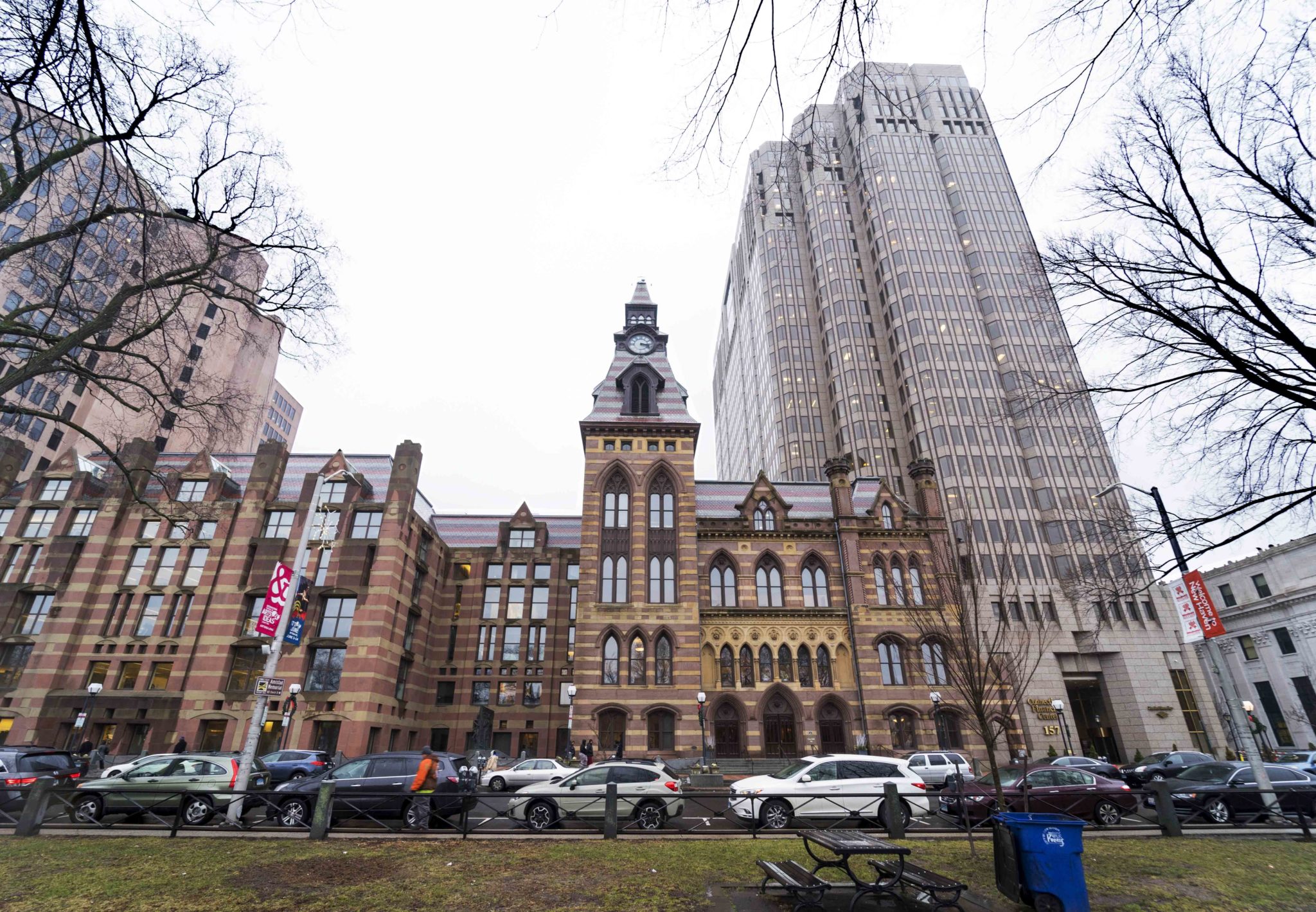Board of Alders holds hearing on supporting LGBTQ+ youth in NHPS
Administration and citizens discuss advances in supporting LGBTQ+ youth, focusing on Gender Student Alliances, all-gender bathrooms and staff education in schools.

Nat Kerman, Contributing Photographer
On Nov. 30, the Board of Alders Education Committee conducted an open hearing to discuss the ongoing support for LGBTQ+ youth in educational spaces. During the meeting, the administration highlighted the progress made in enhancing support for students and listened to the testimonies of various community members, including educators, parents and students, who emphasized the necessity of further action to support LGBTQ+ youth.
The Board of Education unanimously passed a district-wide transgender policy for New Haven Public Schools in 2021. The policy is intended to support the district’s transgender and gender non-conforming students and ensure that every student has equal access to all school programs and activities.
Typhanie Jackson, the executive director of student services for NHPS, discussed the progress that has already been made in bringing the policy guidance to reality. She mentioned how the city “unpacked the policy” for the administrators and provided them with a guidance document to support policies and economic proposals.
“We are happy to say that as far as the inclusive spaces are concerned, 82 percent of our high schools have all-gender bathrooms,” Jackson said. She also mentioned the “huge investment” in mental health first aid training to ensure necessary training for all staff, from security professionals to faculty.
As a part of her testimony, Jackson talked about the city establishing focus groups that have a goal of “not dictating what it is in the district that [the administration] feel is important” but also hearing the voices of students, staff and parents to “shape the work and work in partnership.”
Despite the recent progress, Jackson recognized that more work has to be done in the near future. The current hope of the Board of Education is to focus on promoting the visibility of resources already available, providing additional training to the staff at NHPS, and establishing all-gender bathrooms and Gender Student Alliances in all middle schools.
Dave Weinreb, a representative of the LGBTQ+ Youth Task Force, reiterated the necessity of the aforementioned measures to be implemented but also advocated for broader initiatives. His demands included establishing GSAs in all middle schools and increasing LGBTQ+ visibility, which would involve giving LGBTQ+ community representation in the curriculum of all subjects, not only health education.
Erin Michaud, another representative of the LGBTQ+ Youth Task Force, shared her own experience in the educational environment.
“As a queer teacher, I feel invisible in this city. I don’t know how our students feel. Actually, we do know how they feel. They feel invisible. They feel unseen. They feel unheard. They feel unwelcome. Their attendance is poor. They feel sad, and they don’t want to come to school,” Michaud said.
Resident testimony focuses on the need for GSAs, sex education
Dozens of attendees, including youth ranging from primary to high school students, students’ parents and educators, joined Michaud in testifying about their experiences before the committee. In testimonies, citizens mentioned incidents of staff members forcibly removing a student from a bathroom due to a presumptive judgment about their gender, administration making students request keys to access all-gender bathrooms and teachers using cisnormative language like “boys and girls” that disregard the identities of non-binary students.
The importance of training for staff to be provided in schools was brought up on numerous occasions during the event. Ta’LannaMonique Lawson-Dickerson, the director of political education for the Citywide Youth Coalition, emphasized that it’s not only the presence of the training that matters but also its quality.
“Having a straight cis-gendered person do a training about LGBTQ folks might not be the best idea,” Lawson-Dickerson said, highlighting the importance of personal experience for the correct representation of the issues they face.
One of the central actions that attendees called for was the establishment of Gender Student Alliances in all high schools and middle schools.
Alder-elect Caroline Smith ’14 mentioned that GSAs are valuable not only for people who are directly involved in them but also for those who aren’t quite ready to attend the alliances yet. She described her own experience of being in the closet while growing up in Kentucky, where she was not quite ready to be public about her identity.
“Even just knowing they existed made a difference to me,” Smith said.
Baz Holmes Poynter, a transgender student, also brought up the importance of early age-appropriate sex education. Poynter mentioned how she is often asked inappropriate questions, such as “Do you have a penis?”
Poynter said she wants adults to educate younger students that such questions can make others feel very uncomfortable.
Patti Nicolari, the executive director and founder of PROUD Academy, a private school grades 7-12 for LGBTQIA+ youth, shared her thoughts on the hearing with the News.
“It is sad that we are in 2023, and we are still covering those conversations,” Nicolari said. She noted the gap between the policies that have existed for years in NHPS and the actual experience of gender non-conforming students in the educational setting.
NHPS has 44 middle and high schools.







